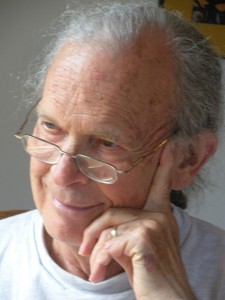It was apparent from the start that conviction was inevitable, and that death was creeping ever closer. Athens feared his inquisitive nature and opposition to the status quo. Facing charges of corrupting youth and introducing Gods of his own making, there were few options as the evidence was indisputable. This did little but embolden Socrates, who saw death as a cure and a freedom of the soul from the body.

The University of Wisconsin’s Terrence Penner discussed the trial and philosophy of Socrates with a packed Jamrich classroom Thursday, April 16. Penner began teaching in 1970 before officially retiring from academia in 2003. The lecture began with an overview of both Socrates wisdom and central themes to the Socratic Method.
“I’m only persuasive if speaking the truth,” Penner said. “What you want from me isn’t a treatise, but a discussion.”
The lecture became more of a question and answer session soon after, with Penner posing questions for the audience to reflect upon. The first question was if Socrates should have been brought to trial for the crimes he was accused of. The point of the discussion was the idea of punishment and blame in society.
“Punishment and blame are never good things to undertake,” Penner said. “What do criminals learn in jail?”
Penner continued with an example from his own youth. He asked the audience if they had ever been spanked as a child. He then explained that he could not remember a single thing he did wrong in his youth to merit such punishment, other than he tried to avoid receiving it.
“Punishment is an extremely blunt instrument, and so is blame.”
Such topics are commonplace in the field of philosophy. The field is defined as the study of knowledge, reality and existence. Socrates has been famously attributed with saying “the unexamined life is not worth living,” something that caught junior political science major Vito Giannola’s attention long before Penner’s lecture.
“Socrates first drew my attention in high school,” Giannola said. “He really made me think, even at that age.”
Socrates believed that discussion could properly achieve more lasting benefits than punishment ever could, Penner said. This stemmed from beliefs in human nature, or Socratic Notions. One of these was that “The Human Good” absolutely exists, even if it didn’t actually reflect a person’s values or beliefs. Happiness was the key.
“Everyone in all his intentional actions desires ultimately their own good.” Penner said.
Goodness therefore, was someone’s ability to achieve the maximum available happiness available to them relative to where they were. Crimes weren’t caused by bad intentions so much as ignorance, Penner said. Moral weakness also doesn’t exist.
“It means you see what the best thing is, and you don’t pursue it because you are weak,” Penner said.
To commit a crime is to lose sight of one’s long term interests in pursuit of the short term, a common human mistake, Penner said.
Unless someone is open to what others say there would exist preconceived notions and biases that would limit a perspective. This is one reason discussion is key, according to Penner.
One point too rarely made in the discussion about Socrates was that selfishness and self-interest were not at all the same, Penner said. Impacting others in a positive way was one of the highest forms of self-interest, which isn’t at all a selfish notion.
“Selfishness is not giving a damn about what happens to other people,” Penner said.
Part of the appeal of studying historic philosophers is facing what you don’t know. Socrates said, “True wisdom is admitting what you don’t know.” It can be daunting to admit what knowledge you lack, but at the same time, it is very beautiful, junior philosophy major Alex McCracken said.
“To deprive yourself of [philosophy] is to deprive yourself of a substantial part of human history,” McCracken said.






















